In the growing darkness of November, the sacred fires are lit by the wisdom keepers of our age!
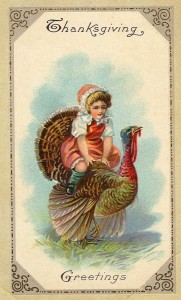 It’s Sunday again. Last week, I wrote about the growing popularity of one U.S. holiday – Halloween. Now, a week has passed and, collectively speaking, America has turned its attention to yet another holiday – Thanksgiving. With that shift come new decorations, sacred family traditions, and most importantly, a squeaky-clean mythos involving a big ship, a bunch of Pilgrims, and of course, the “Indians.”
It’s Sunday again. Last week, I wrote about the growing popularity of one U.S. holiday – Halloween. Now, a week has passed and, collectively speaking, America has turned its attention to yet another holiday – Thanksgiving. With that shift come new decorations, sacred family traditions, and most importantly, a squeaky-clean mythos involving a big ship, a bunch of Pilgrims, and of course, the “Indians.”
With that in mind let’s consider reversing the thread from last week’s post in which I examined a spiritual holiday going secular. What if we ushered in a secular holiday, Thanksgiving, with a definitively spiritual experience? What if we could reach into that modern American mythos to find a deeper meaning through a connection to the very spirit that resides within these lands? What if we could celebrate that spirit in a traditional way with the elders of the indigenous populations?
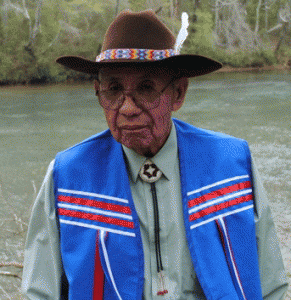
Sam Proctor
Muskogee (Creek)
This past weekend, the Sacred Fire Foundation made this a real possibility. In Atlanta, Georgia, the Foundation hosted its annual Ancient Wisdom Rising retreat. The annual event is a gathering of community elders from a across the globe who guard that ancient spirit – the one that emanates from deep within the Earth. Each year, these wisdom keepers come together to share their stories, offer counsel, and demonstrate the ancient traditions that have survived for centuries.
Over the years the retreat has been held in a variety of locations including California, Washington State and New York. This year the event was back on the East Coast. Coming to Georgia, specifically, was a powerful choice for the Foundation because it paved the way for a spiritual and ancestral reunion for one of the visiting elders: Sam Proctor. As written by their Board of directors:
“Almost two centuries since the removal of his People from Georgia, Mr. Sam Proctor, respected Muscogee (Creek) spiritual leader from Oklahoma, returns to the shores of the Chattahoochee River to share his message of peace and time-tested wisdom about a heart-centered way of living.” (From Ancient Wisdom Rising, September Newsletter)
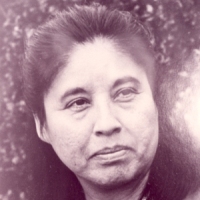
Marie Junaluska
Cherokee Elder
After visiting the retreat site near the banks of the Chattahoochee, Mr. Proctor said, “The Ancestors are still here.” During the weekend, he shared Muskogee traditions and, with other members of the Muskogee Nation, led a traditional Social Fire Dance welcoming the attendees to the land of his ancestors.
Joining him was Marie Junaluska, a Cherokee elder living in Western North Carolina and Kevin Welch, Cherokee Master Gardener. Their people’s ancestral heritage can be traced to the Blue Ridge Mountains of North Georgia, Western North Carolina, and Eastern Tennessee. Like the Creek, the Cherokee were forcibly removed from Georgia and made to walk the infamous, “Trail of Tears.” Despite this painful history, the Cherokee spirit lives on. Ms. Junaluska has been sharing, teaching and passing on the Cherokee culture and traditions for over thirty years. And, Kevin Welch speaks out for the preservation of heirloom plants and growing techniques native to this Southern landscape and the Cherokee people.
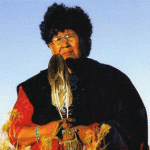
Grandma Walking Thunder
Navajo Medicine Woman
In addition, Ancient Wisdom Rising welcomed two other elders from North American indigenous cultures. Grandmother Walking Thunder, a healer and sand painter, shared the spirit of the Dine’ Medicine People (Navajo) and her experiences as a medicine woman. Coming from Alaska, Larry Merculieff of the Aleut Peoples shared the Aleutian teachings on the Oneness with Nature and the Great Womb of life. He is a one of the last Aleuts to be fully raised in the traditional way.
Larry Merculieff Speaks:
The Sacred Fire Foundation also invited wisdom keepers from cultures originating outside of the U.S. Sobonfu Some’ of the Dagara Peoples of West Africa’s Brukina Faso shared the traditions of her people.
From Southern Asian traditions, Marcy Vaughn, a practitioner of Tibetan Buddhism and Bon, led a visualization and a talk on compassion. And, Ustad Ghulam Farid Nizami, a Sufi from Pakistan and a 17th generation musician, shared the healing powers of sound and music.
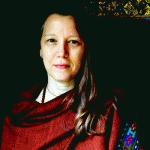
Marcy Vaughn
Tibetan Buddhism and Bon
Not everyone has the opportunity to attend a comprehensive inter-spiritual event like this. However, in reading the stories and watching the videos, it is possible to understand why these elders are reaching out to help humanity through their ancient traditions. More importantly, it is possible to understand how their teachings can help us rediscover our own connection to the Earth and benefit our journey, no matter what the path.
Once again, my thoughts return to the secular Thanksgiving – a holiday that focuses on community, compassion, tradition, and natural abundance. Can we re-sculpt the mythos to breathe a new spiritual life into that holiday? The story centers on an indigenous population, the “Indians,” teaching the new inhabitants, the Pilgrims, about the land and its creatures. It ends in a peaceful shared community feast that we now replicate every November.
Can we bring the spiritual into the secular? Can we transform this myth to focus on the teachings of the wisdom keepers who strive to bring humanity back into balance with Nature? Can we rededicate Thanksgiving to that ever sacred and shared wisdom that passes effortlessly from hand-to-hand, from drum beat to drum beat, from the heart to the heart through the eternal spirit fires of this wonderful Earth? And what if we did….

Courtesy: NASA / Goddard Space Flight Center
An Aside: I realize that there may be some readers who are not well-versed in Native American history, specifically that of the South East, or know much about Thanksgiving. Click on the following links for quick background reads:
About Thanksgiving from The History Channel
Native Americans in Georgia: Link Page with lots of Information. Or, go directly to the Cherokee‘s or Muscogee‘s site.
The Wild Hunt is not responsible for links to external content.
To join a conversation on this post:
Visit our The Wild Hunt subreddit! Point your favorite browser to https://www.reddit.com/r/The_Wild_Hunt_News/, then click “JOIN”. Make sure to click the bell, too, to be notified of new articles posted to our subreddit.
It is a good question/idea.
Personally, I feel that respecting the local spiritual energies at the turning points of the year are great ideas and far more pivotal than tipping a nod to gods from far off places.
Of course, I know that such an idea is less than popular amongst a lot of people.
I daresay we generally tip nods to gods that have touched us one way or another. It’s grace, wheresoever they were first worshipped.
I’m not saying not to do that (as well), but seasonal celebrations just seem to make more sense if done locally. (Midwinter in New Orleans will have a very different feel to midwinter in Tromso, for example.)
I agree with your climatic sensitivities. My part of the country had a serious drought this past summer, and celebrating first harvest felt odd when there wasn’t any. Last winter had hardly any snow, and the symbolism of midwinter was likewise a bit anomalous. I assume that if these are persistent global-warming trends, our symbolism will adapt. Fortunately Paganism confers prestige on those who are liturgically creative.
I’m not convinced how fortunate that is.
Midwinter in Minnesota has much more in common with midwinter in Tromso than in New Orleans. It seems to be worth saying.
It wouldn’t surprise me, but I am still unconvinced of how connection to the land at that time is best served by invoking far-off energies and entities.
In a word? Because they’re not “far-off”. At least, they’re not necessarily “further off” than they are where you live.
I haven’t spent as much time in the English countryside as I would like, but I did spend some time in London; not much of a connection to the gods I worship there, as far as I was able to detect. The strongest connection to those gods I felt in the Harz Mountains in Germany. There are places here where the connection to the gods is much more on the Harz Mountains end of the scale than the London end of the scale, if you understand my meaning.
If your intent is to say that a “connection to the land” is better served by invocation of or offering to local spirits rather than the major gods of the pantheon, I would counter that a relationship with one of those groups should always lead to a relationship with both of them. I do not think that one really can exclude one or the other.
I’ve spent time in London. It feels ‘dead’. I hate urban areas.
My intent was never to say that one or other category was more important, merely that, each are more suited to different situations.
“I’ve spent time in London. It feels ‘dead’. I hate urban areas.”
I would tend to agree.
I’m fairly certain we’ve had this conversation before, but there is ample evidence that gods move with the people who worship them.
Yes, but those are more gods of people, than of places.
I would say rather that a people’s gods move with them, with the exception of the gods of particular places, and even then there are exceptions. The majority of any pantheon is not, I think, made up of “gods of the place,” although there are places with particular connections to specific gods.
Place-specific deities seem to be somewhat less common than the other kind. Within the Germanic cultural sphere, I’m coming up with Nehallenia at the mouth of the Rhine as the only clear example (not a Germanic goddess originally, but worshiped by Germanic and Celtic peoples in that area, as well as by Romans). Zîsa at Augsburg is another possibility, as is Skaði in Trondheim.
I’d argue that most of the Vanir are locational deities, with the Aesir being gods of the people that arrived in Germanic dominated lands with the arrival of those tribes. (The implication is there is the stories of the gods, with the Aesir arrival in the lands of the Vanir sparking a war.)
Again, I am not saying that anyone should ignore the gods of the people. These could easily been seen as ‘every day’ gods and individual patrons. But the local gods seem, to me, to fit far better for seasonal rites – the dance of the land with the seasons.
“I’d argue that most of the Vanir are locational deities,”
I’d argue that the ones whose names we know aren’t, if only because we know that they were not worshiped in Iceland before the 800s (and the diaspora from Norway), but they were worshiped there afterwards. The Vanir in general, as fertility gods, may include in their number purely local spirits of vegetation and the land, but that doesn’t mean that they are all purely local.
“with the Aesir being gods of the people that arrived in Germanic dominated lands with the arrival of those tribes. (The implication is there is the stories of the gods, with the Aesir arrival in the lands of the Vanir sparking a war.)”
That implication is actually not in any of the original sources that I remember, but is rather an interpolation by late 19th c. and early 20th c. scholarship. There is a better theory as to what this war means, and reflexes of a similar story are present in Vedic myth (the war between the Devas and the Ashvins) and Roman legend (the war between the Romans and the Sabines), suggesting that this idea of a war between different groups of gods resulting in their union into one divine society comes from a Proto-Indo-European myth, rather than some dimly-remembered historical account of warring culti.
Interestingly enough, the war between the Devas and the Ashvins was over whether the Ashvins, like other gods, could get the benefit of the Soma sacrifice. This seems similar to strophe 23 of the Völuspá, having to do with the war between the Æsir and Vanir:
“Þá gengo regin öll á rökstóla/ ginnheilög god ok um þat gættuz/
hvert skyldo æsir afráð gjalda/ eða skyldo goðin öll gildi eiga.”
“Then went all the gods to judgement-seats, the greatly-holy gods, and tended to that: whether the Æsir should pay tribute, *or whether all the gods should own sacrifice*.” (my own translation)
“But the local gods seem, to me, to fit far better for seasonal rites – the dance of the land with the seasons.”
I suppose you could think of it that way, but I tend to see the seasonal holidays as being connected to the great moments of the mythological cycle, and therefore being a much more than purely local thing shining through a local phenomenon.
The later 19thC. – early 20thC. scholars based their ideas on the (admittedly Christianised) ‘prose’ Edda of Snorri, where the Aesir are seen to be Trojans, whilst the Vanir are indigenous to Scandinavia. As such, I would say that there is suggestion of this migratory/sedentary aspect much earlier than the later Victorian period.
I often wonder if this myth is an ancient remembering of the conflict between H. Sapiens and H. Neanderthalensis (who were displaced by early migrations from the south east of Europe, with their final stronghold being north western Europe.)
For the last several years I’ve decided to make Thanksgiving a time to give thanks to the land of North America for its gifts. I’m aware of much of what I was taught about the history of the holiday was myth, but myths still mean something, right? What is this myth about? Well, it’s one of the few stories I was taught as a kid where the Europeans and Indians were actually getting along! I’m a Heathen, but I l live on this land and eat from this land. The Thanksgiving meal is full of Native American foods like turkey, corn, potatoes, green beans, cranberries, sweet potatoes, pumpkin, etc. I think this makes a lot of sense. So this is my holiday to honor this land, the native people, and the native plants and animals. It just seems like good hospitality to do that.
I know some Native American groups make Thanksgiving a day of protest, and while it’s not my business to tell them what to do, I’ve always felt Columbus Day was a better day for that. But I’m sure that’s because Thanksgiving is just too warm and fuzzy to me to think of it that way. I’d like to make Turkey Day something happy and positive, and honoring the Land is my way to do that.
Same here. I protest on Columbus Day, and instead include Thanksgiving in the list of harvest/winter feasts as a day for family (living and dead) and good luck. It already carries those connotations, so it nicely fits into a heathen worldview for me.
What has any of this to do with football and shopping?
Some words about Thanksgiving from Jacqueline Keeler, a member of the Dineh Nation and the Yankton Dakota:
http://www.purewatergazette.net/nativeamericanthanksgiving.htm
I sure hope so.